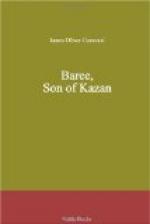A choking note gathered in Baree’s throat. He threw up his head. Straight above him was the Red Moon, inviting him to the thrill and mystery of the open world.
The sound grew in his throat, and slowly it rose in volume until his answer was rising to the stars. In their cabin Pierrot and the Willow heard it. Pierrot shrugged his shoulders.
“He is gone,” he said.
“Oui, he is gone, mon pere” replied Nepeese, peering through the window.
CHAPTER 18
No longer, as in the days of old, did the darkness of the forests hold a fear for Baree. This night his hunt cry had risen to the stars and the moon, and in that cry he had, for the first time, sent forth his defiance of night and space, his warning to all the wild, and his acceptance of the Brotherhood. In that cry, and the answers that came back to him, he sensed a new power—the final triumph of nature in telling him that the forests and the creatures they held were no longer to be feared, but that all things feared him. Off there, beyond the pale of the cabin and the influence of Nepeese, were all the things that the wolf blood in him found now most desirable: companionship of his kind, the lure of adventure, the red, sweet blood of the chase—and matehood. This last, after all, was the dominant mystery that was urging him, and yet least of all did he understand it.
He ran straight into the darkness to the north and west, slinking low under the bushes, his tail drooping, his ears aslant—the wolf as the wolf runs on the night trail. The pack had swung due north, and was traveling faster than he, so that at the end of half an hour he could no longer hear it. But the lone wolf howl to the west was nearer, and three times Baree gave answer to it.
At the end of an hour he heard the pack again, swinging southward. Pierrot would easily have understood. Their quarry had found safety beyond water, or in a lake, and the muhekuns were on a fresh trail. By this time not more than a quarter of a mile of the forest separated Baree from the lone wolf, but the lone wolf was also an old wolf, and with the directness and precision of long experience, he swerved in the direction of the hunters, compassing his trail so that he was heading for a point half or three-quarters of a mile in advance of the pack.
This was a trick of the Brotherhood which Baree had yet to learn; and the result of his ignorance, and lack of skill, was that twice within the next half-hour he found himself near to the pack without being able to join it. Then came a long and final silence. The pack had pulled down its kill, and in their feasting they made no sound.
The rest of the night Baree wandered alone, or at least until the moon was well on the wane. He was a long way from the cabin, and his trail had been an uncertain and twisting one, but he was no longer possessed with the discomforting sensation of being lost. The last two or three months had been developing strongly in him the sense of orientation, that “sixth sense” which guides the pigeon unerringly on its way and takes a bear straight as a bird might fly to its last year’s denning place.




